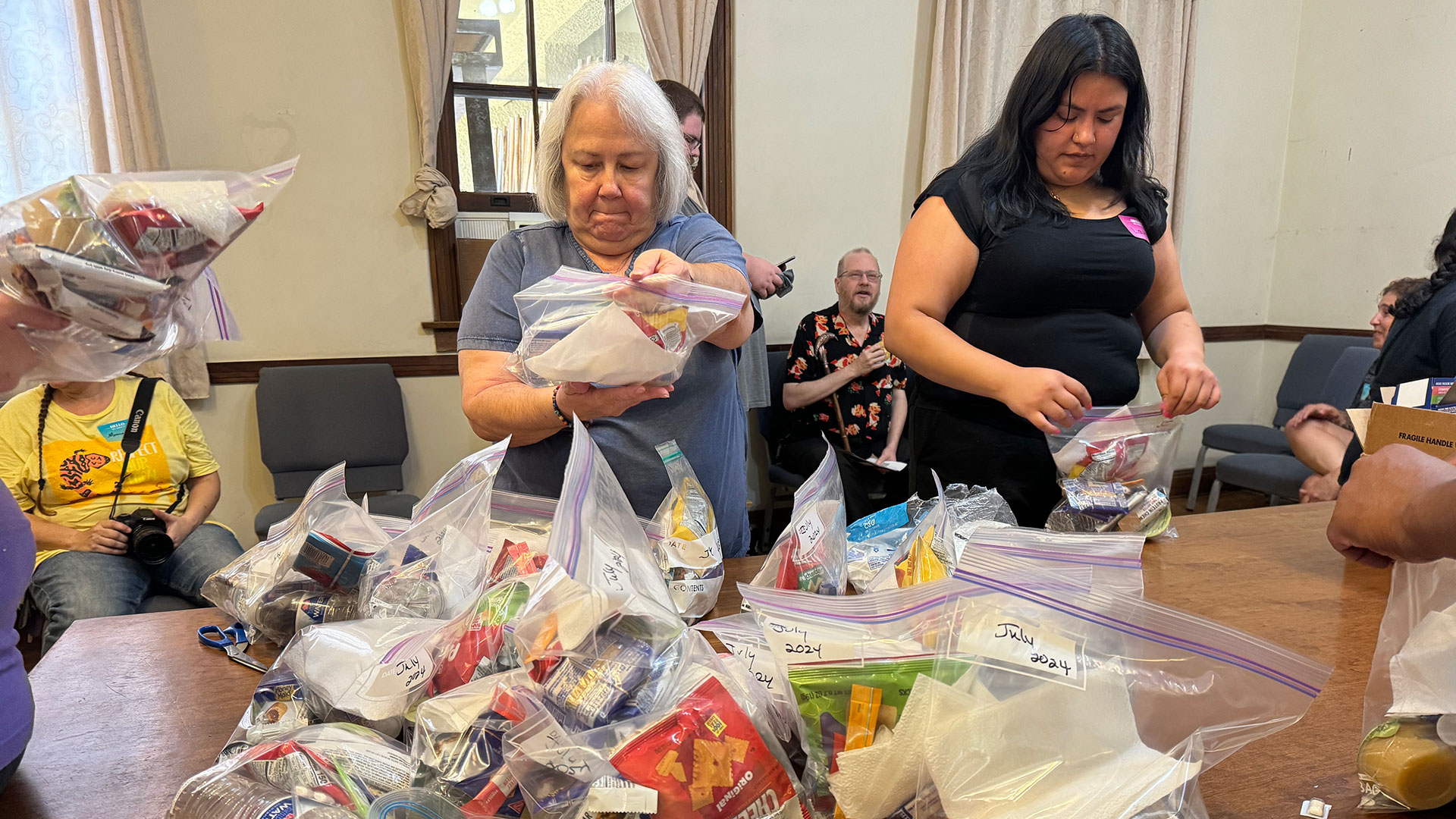 Two volunteers pack bags of snacks to pass out to unhoused people in Tucson at the Historic Y on Sunday, July 22, 2024.
Two volunteers pack bags of snacks to pass out to unhoused people in Tucson at the Historic Y on Sunday, July 22, 2024.
It’s midday on a hot July Sunday, at the conference room at Tucson’s Historic Y on Fourth Avenue.
The rustling of cardboard and chattering voices echo off the hardwood floor as Bennett Burke instructs a group of volunteers crowded around a long table.
“Okay, so two graham crackers, one water bottle, applesauce, one cereal bar, one protein bar,” he lists, as he shows the group an example of their task.
The group, organized under the name Matthew 25:34, is packing snack bags to distribute to Tucson’s unhoused population and their pets.
Although their name is a bible verse that talks about feeding the hungry, Burke is clear; this isn’t a traditional church volunteer event.
“A lot of groups that assist unhoused people… it's conditional. You sit down, and listen to us preach and talk about being saved, and all these things that people are used to. And then we'll give you some food,” he said.
Burke and Celia Jose, the presiding Bishop of the Liberal Catholic Church International, are a pair of progressive bishops in Southern Arizona who have shifted the focus of their religion to community organizing instead of preaching.
The Liberal Catholic Church International is a progressive and independent church branch that started in Casa Grande a number of years ago.
Burke and Jose said that their decision to close their church doors stemmed partially from the pandemic, but also because religion in America, especially on the left, is changing.
“I think the messages of progressive religions are probably getting lost a little bit with voices that speak a little louder about division,” she said.
Both clergy members have almost entirely left preaching behind. Besides a small service in Tucson once a month, Burke’s job has taken on entirely new shape.
“We are almost completely transitioning from being a church that holds services, to an organization, a movement that welcomes everybody as volunteers. We have people of many faiths and they're no faith. I've had people say to me, I'm an atheist. And I say, I don't care. Do you want to help people? Yes, come on. That's all we care about,” he said.
Jose gave her last traditional service a few months ago.
“I didn't want to be asking my congregation for money just to pay the rent, when that money could go somewhere else that was more useful and more helpful to the community. So we closed that on Easter Sunday. And we've been doing it full time this way,” she said.
According to the 2024 Point in Time Count, at least 1,200 people are currently unsheltered in Tucson. Burke said leaving religion out of their work is really important, not only with recruiting volunteers, but especially when they interact with those in need.
“If we limited our outreach to only people who were affiliated with us, we'd only have four or five volunteers in there,” he said. “This is not our church members doing this, this is anybody we can get to help. We don't preach to people at all. Once in a while somebody will say, ‘Are you are you from a church?’ And I say yes. And that's all I say.”
Burke said a potential volunteer once talked with him for an hour before agreeing to help.
“She wanted to be sure there was no con game going on here, where we were going to try and recruit people,” he said.
The group packed 200 snack bags in under half an hour, and they can take home as many as they think they can distribute.
“I can't contribute money. But time can be just as meaningful,” Theresa Conway said. She doesn’t identify with any religion.
“200 bags to go to 200 people, that's 200 People who are seeing the good in humanity, just for a second. Random acts of kindness. That's what I believe in,” Conway said.
Burke said he distributes food and water at least once a week.
“Food and direct assistance is important. But human contact is really important,” he said. “Just spend an hour or so and just go out and hand out some stuff. Talk to people.”
With a successful inaugural event completed, the group plans to meet and pack more bags, including menstrual and hygiene kits, at least once a month going forward.
For donations of snacks and other products, Burke’s Amazon Wish List can be found here.

By submitting your comments, you hereby give AZPM the right to post your comments and potentially use them in any other form of media operated by this institution.